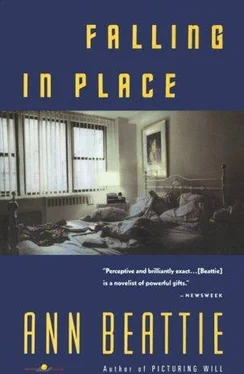Ann Beattie - Falling in Place
Здесь есть возможность читать онлайн «Ann Beattie - Falling in Place» весь текст электронной книги совершенно бесплатно (целиком полную версию без сокращений). В некоторых случаях можно слушать аудио, скачать через торрент в формате fb2 и присутствует краткое содержание. Год выпуска: 1991, Издательство: Vintage, Жанр: Современная проза, на английском языке. Описание произведения, (предисловие) а так же отзывы посетителей доступны на портале библиотеки ЛибКат.
- Название:Falling in Place
- Автор:
- Издательство:Vintage
- Жанр:
- Год:1991
- ISBN:нет данных
- Рейтинг книги:4 / 5. Голосов: 1
-
Избранное:Добавить в избранное
- Отзывы:
-
Ваша оценка:
- 80
- 1
- 2
- 3
- 4
- 5
Falling in Place: краткое содержание, описание и аннотация
Предлагаем к чтению аннотацию, описание, краткое содержание или предисловие (зависит от того, что написал сам автор книги «Falling in Place»). Если вы не нашли необходимую информацию о книге — напишите в комментариях, мы постараемся отыскать её.
Falling in Place — читать онлайн бесплатно полную книгу (весь текст) целиком
Ниже представлен текст книги, разбитый по страницам. Система сохранения места последней прочитанной страницы, позволяет с удобством читать онлайн бесплатно книгу «Falling in Place», без необходимости каждый раз заново искать на чём Вы остановились. Поставьте закладку, и сможете в любой момент перейти на страницу, на которой закончили чтение.
Интервал:
Закладка:
She came down in a few minutes, in green slacks and a black halter, wearing tennis shoes, her hair still braided, but sopping wet.
“Let’s go, let’s go,” she said, picking up the basket on the kitchen table. She said to John Joel: “What are you doing this summer?”
“Nothing much,” he said.
“My car,” Tiffy said. “I cleaned it inside, and everybody has to praise it.”
“It looks wonderful,” Louise said.
“I want to sit in the back,” John Joel said.
“There’s no place to vacuum your car around here,” Tiffy said. “I gave up. Last night I wet a sponge and sponged this car clean. It was full of grit and dog hair from my sister’s dog. It looked horrible. Does it smell like dog? I can’t even tell anymore.” Tiffy waved to her husband as she pulled out of the driveway. He had on a straw hat, and he tipped it as the car pulled away.
“Now tell me what you’ve really been doing this summer,” Tiffy said, looking in the rear-view mirror. He slid around in the back seat. He couldn’t think what to tell her except to tell the story about going to the museum again. So he told her about the show he had seen, or tried to, but she broke in: She’d seen it, too. And Calder’s Circus. She started talking about that, how quirky it was, how it always made her smile to see it. How she wanted to shrink and get inside with the circus animals and performers, and tumble around in the case with them at night, because she was sure they did. “I don’t know,” she said to Louise. “Maybe I’m just getting old, but when I went through the Segal show, I felt so frustrated. I felt like those things were so still , and when I stopped to look at Calder’s Circus again on the way out, I felt like they had little hearts beating, and that their little eyes blinked and their mouths smiled when they were alone. When Segal’s people were alone, I thought they’d be just as still. That they couldn’t move, under any conditions.”
Tiffy’s car was an old Cadillac, a black 1955 Cadillac, and it rode as though the shocks were completely worn-out. He had been in her car once before, and he just remembered that it had made him sick. It was hot in the back seat, too, even though Tiffy was driving fast enough that wind blew through the car and slapped him in the face. He tried to concentrate on not being sick. He kept thinking about the picture of the relative that Parker had given away, of how strange the woman in the picture looked. Pictures of his mother when she was a young girl looked the same way; not that she looked anything like Parker’s funny-faced relative, but the pose was the same: The faces looked flat, and they were close to the camera. There was a picture on his father’s dresser — what used to be his father’s dresser — of his mother when she graduated from high school. It was a hand-colored photograph, his mother had told him, and the pearls she wore around her neck were the same color as her teeth and the whites of her eyes. She had on a pink sweater in the picture, and a barrette in her hair, and he could not imagine his mother looking that way. As mothers went, she was pretty. She wore a little make-up, unlike Tiffy, and she didn’t have a horsey face like Parker’s mother, and nobody was as ugly as Marge Pendergast. All her children were ugly, too. He wished that he looked more like his mother or father. He wondered if he would be better-looking if he weren’t fat. Mary wasn’t fat, but she wasn’t very good-looking, and he thought that was true objectively — not just because she was his sister and he hated her.
Going back to his grandmother’s house in Rye, the day he had had lunch with Nick and his father and the girl whose name he had forgotten again, his father had asked him if he liked any girls. He hated to be asked that, because there weren’t any girls he liked. So he had made up a lie about a girl he had liked who had transferred to another school in the middle of the year. He had even described her: bangs, glasses, tall. They had been in the drinking car, standing up. He had been having a ginger ale, and his father had been having a gin and tonic. “What girls do you like?” he had asked his father. It had just come out, before he realized what a ridiculous question it was. His father had been taken aback by it. His father had said that he liked Louise. “What did you think of Nick’s girlfriend?” his father had asked him after a while. And for some reason he hadn’t wanted to let on that he thought she was pretty. He had shrugged. His father had said, “Not your type, huh?” There was another long pause; then, finishing his drink, his father had said: “Well, I think she’s quite pretty.”
In the front seat, Louise was telling Tiffy about the last picnic the family had gone on.
“There were these two silly girls at the park on Friday night. They were with two boys, and all four of them were drunk, and I actually envied them for having such a mindless good time.”
“There’s nothing wrong with having a mindless good time once in a while.”
“At least I said something that night that I’d wanted to say for a long while. Not that there was any response to it, but I finally said it. It was about my dog. I said that I wished I had the dog back, and that I could be playing ‘get the stick’ with Mr. Blue. No wonder I liked the dog. It was so dogged. It was just like me. It would’ve played ‘get the stick’ until it fell over dead, and I’d go on those stupid picnics and trudge through the snow if he kept saying we should go there.” Louise sighed. “I’m sorry,” she said. “I talk about the dog too much.”
“You don’t talk about it very much,” Tiffy said.
“She does,” John Joel said. “All the time.”
Tiffy pulled into a graveled drive, in the shape of a half circle, and parked behind a yellow truck. Tiffy had found out about this place from a friend: It wasn’t advertised, but one day a week the farmer let people come and pick berries, and he weighed them on a scale on his back porch. Tiffy always knew about things that no one else knew about: meetings in people’s apartments, places to pick strawberries, places to swim without getting caught, books that had been written but not published. Whenever she talked about a book, she’d say: “You have to read it when it comes out,” and when she talked about a movie she’d seen, it was always “at a screening.” He could understand why his mother was in awe of Tiffy, but she was so unlike his mother in so many ways that he was surprised his mother liked her so much. According to his mother, Tiffy did everything right. His father didn’t take Tiffy seriously. His father just thought that Tiffy was pretentious and talked a lot. He hoped that his mother wouldn’t tell his father about this day on the weekend, because they were sure to get into a fight about it.
As he followed his mother and Tiffy through the high grass to the strawberry field, he picked up snatches of the conversation. Tiffy was talking about what was wrong, politically, with The Deer Hunter . She kept stressing that word— politically . His mother nodded and didn’t have much to say. It was hot in the field, and he wished he had on looser clothes. Tiffy had left the basket with the food back in the car. They probably wouldn’t be eating for another hour. He swatted a yellow butterfly away, and when it fluttered he saw that it was a butterfly and a smaller butterfly, or a moth. They swirled up and flew away. A mosquito buzzed in his ear.
There were about ten people over the crest of the hill, picking strawberries that grew in neat rows. He hated the idea of bending over in the heat to pick berries and wondered why he’d come. There was no way out of it. He took the container his mother held out and went to one of the rows and began groping under the leaves for the berries. Every berry was ripe and large, so it didn’t matter what he pulled off. He thought about the pie his mother had said she’d make, and hoped that she’d make two. He hoped that Mary would eat at Angela’s.
Читать дальшеИнтервал:
Закладка:
Похожие книги на «Falling in Place»
Представляем Вашему вниманию похожие книги на «Falling in Place» списком для выбора. Мы отобрали схожую по названию и смыслу литературу в надежде предоставить читателям больше вариантов отыскать новые, интересные, ещё непрочитанные произведения.
Обсуждение, отзывы о книге «Falling in Place» и просто собственные мнения читателей. Оставьте ваши комментарии, напишите, что Вы думаете о произведении, его смысле или главных героях. Укажите что конкретно понравилось, а что нет, и почему Вы так считаете.












